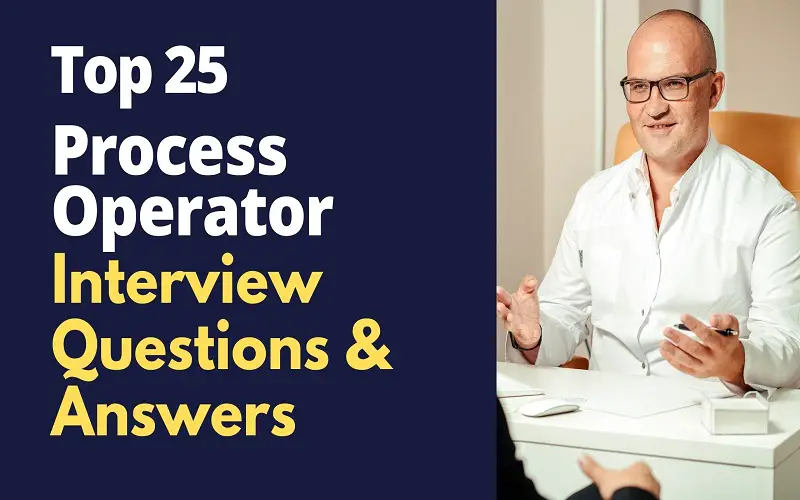You have successfully applied for a process operator job and you have been invited to an interview? Congratulations. But now you are wondering what awaits you there? First and foremost, it will be a matter of checking whether you are really suitable for the advertised position from a professional point of view. What is your motivation? How big is your passion for the job? Be prepared to ask related questions.
1. Why Are You Interested In This Role?
Companies with a strong focus on operational excellence need to continuously improve their key processes. To be able to successfully plan and implement continuous process improvements, they require process operators. And this role often comes with a lot of work and a lot of responsibility.
Process operators have the task of knowing the process from the inside out. They should be as well networked and recognized as possible in all teams involved in the process. This is the only way they can see how the process is really going. A process operator does not control “from above” but addresses things in a collegial manner.
And I’ve always liked the idea of that – ensure things are running smoothly and effectively, and lead beyond the hierarchy.
2. What Are The Roles Of A Process Operator?
This is a highly diverse job, and it depends on the industry, company size, level of automation, and process orientation. Some general roles that come to my mind are:
Process Operators Monitor The Operation Of Plants Or Factories To Ensure Efficiency. They May Need To Oversee Production In Accordance With Policies Or Guidelines Set By Supervisors Or Employers. The Operator Must Acquire An In-Depth Knowledge Of The Plant’s Distributed Control System (DCS) And May Be Required To Review And Implement Safety Protocols.
When Overseeing The Factory, A Process Operator Needs To Fix Problems As Quickly As Possible To Ensure Production Stays At The Most Efficient Capacity. Maintenance Is An Important Aspect Of The Job.
3. What Are The Qualities That A Process Operator Need To Be Successful?
Process operators bear a great deal of responsibility because they have to keep an eye on all business processes that can ultimately affect the success of the company. A high level of specialist knowledge is therefore an absolute prerequisite in order to be able to assess where the weak points of a process lie. However, it depends on the company and the industry in which area they have to be an expert.
In addition to technical knowledge, a whole range of soft skills plays a major role in successfully exercising the profession. Logical-analytical thinking skills are essential to grasp which processes need improvement and how errors can be corrected. This requires a high degree of judgment. A process operator often has to solve complex tasks and act in a network if processes are to be recorded in their entirety. In order to ensure the company’s success, a process operator must always work in a solution-oriented manner and must not lose sight of the set goals.
If new processes are to be introduced, a high level of critical faculty is often necessary, because management and employees are not always enthusiastic when traditional ways are to be redesigned. For the process operator to be able to deal well with possible criticism and get their points through despite resistance, they should have strong communication skills.
4. What Major Challenges Did You Face During Your Last Role? How Did You Manage Them?
It is difficult to follow and be up to date with the changes that occur in the field of technology, which translates into the production sector. Today, the trend is for technology and production to try to converge these transformations.
The critical part of this process is sharing that from the highest position in the production process area to the operational one. The process operator is the one who makes this bridge, being a fundamental piece in the challenge of making technology an ally in the operational process.
I try to follow new technology trends and propose innovative ways to improve the production process. However, things don’t stop there. As my experience shows, getting a green light for implementing new technology is just one piece of the puzzle. The real difficulty comes in teaching others to use the technology and influencing their openness to change.
5. Describe Your Daily Routine As A Process Operator?
The process operator supports the chief process officer in the operational execution of the process. In day-to-day business, they are often responsible for the operational management of the process. Alternatively, the process operator is also used as a sub-process manager on the next level of the process model. My main day-to-day task activities would include: operational control of the process, development, and execution of a functional operative process controlling, planning and execution of operational process performance, operational competence and resource planning of the process, and coordination with other processes (interfaces), process modeling….
6. Describe Briefly About Your Experience?
I have a master’s degree in process engineering, with in-depth knowledge of the core areas of process engineering such as biotechnology and particle technology, separation processes, and transport processes. I have worked as a process operator for five years for a manufacturing company. They produced computer and electronic parts. Unfortunately, the company decided to close its subsidiaries and focus only on its headquarters plant, which is stationed in another country.
7. What Kind Of Strategies And Mindset Are Required For This Role?
A process operator is a professional responsible for managing and improving a set of processes that an organization needs to function. For example, in the manufacturing industry as in your case, a process operator can monitor production quality, conduct safety inspections, and develop process improvement projects. The centrally coordinated all resources required for process control and execution. The goal of a process-oriented company organization is high customer satisfaction and high productivity. These are the points that the process operator should primarily focus on. The process operator coordinates tasks and activities at all process levels. They should have the necessary authority in doing so, to make process optimizations and manage the process consistently to ensure the delivery of an optimal work result.
8. What Is The Biggest Challenge You Foresee In This Job?
Process operators work in plants or factories and can sometimes be exposed to harsh and dangerous working conditions, examples are dust, noise, and chemicals. Another challenge comes from the fact that process operators bear a great deal of responsibility because they have to keep an eye on all business processes that can ultimately affect the success of the company.
9. How Do You Stay Motivated At Work?
It’s hard to motivate yourself when you don’t know exactly what you have to do. To be successful, I plan my daily responsibilities. And it’s not enough to just keep these things in my head –I declutter and make a clear to-do list of all the tasks.
10. Describe A Time You Failed In This Role And The Lesson You Learned?
Most of the time things went smoothly for us. But I can think of the Cost-Cutting working group, where I, along with some of the management gave instructions on cost reductions. Somehow that didn’t go right. Actually, everyone wanted the other to save. In the end, it was very unsatisfactory.
I then initiated cost reduction programs in my area and hoped to set a good example. We did manage to reduce costs by up to 20%. Unfortunately, a joint program for cost-cutting did not come about.
11. Why Do You Feel You Are Qualified For This Role?
I have the right combination of industry experience and formal training in process operation for production technology. I also have the ability to quickly learn new technologies and computer programs.
My other strengths are the willingness to work shifts and Saturday/Sunday work, and also possessing a valid forklift license. I have very good computer skills and have experience with both working as a part of a team and on my own. I have strong leadership skills and responsibility for the performance of the business processes.
12. Share With Us Your Greatest Achievement
I am a team player and have always enjoyed working in groups. In the teams that I led, very different people worked together, motivated by different tasks. Since taking over my team, I have increased productivity by 15 percent.
13. Which Steps Would You Take That Would Lead To Process Improvement And Innovation?
Process improvement and innovation are very important both for remaining competitive in the market, as well as achieving operational excellence. Some ways through which I would encourage process improvement would be tracking the competitive environment, technologies, and changing customer requirements. Identifying and assessing needs and opportunities for incremental process improvement and innovation. Receiving, reviewing, and, if necessary, implementing proposed changes from the organization. Checking for possible sub-optimization and initiating process change.
Another way is by coordinating and leading change projects or representing and promoting the process design.
14. How Do You Identify The Process Indicators?
Process KPIs depict the performance of business processes in metrics (KPIs). Process indicators are derived from the corporate strategy and/or from the (internal/external) customer requirements. The continuous optimization of business processes is achieved through the use of process improvement methods, which would be monitored by the designed key performance indicators.
15. List Some Reasons That Prevent The Success Of The Process Operator Role
The role of the process operator is very beneficial for all kinds of companies, but even more so in production/ manufacturing plants. Some reasons why the process operators are not fulfilling their potential are, for example, if the management team doesn’t care enough about the role. Furthermore, if the process operators do not understand their tasks, responsibilities, and competencies. If the process operators are not responsible for process improvements or are not experienced, executives. Another issue is if the organizational structure is too complex to accommodate the role. And lastly, if the employees feel more assigned to functions than to processes.
16. What Are Some Benefits Of The Process-Oriented Companies?
A purely process-oriented organization replaces the function-oriented organization. The formally described hierarchy of the company is structured according to the organizational processes and no longer according to departments. As a result, there is no longer any separation between functional and procedural responsibility. A purely process-oriented organization is characterized by full integration and a high level of autonomy in business processes.
The reputation of process orientation in companies continues to increase. The reason for this is that various advantages can be achieved with the goals aimed at in the process-oriented company organization (customer satisfaction and productivity). Thus, these two goals represent the key to the success of a company and the associated tasks of the process operator. These two points will, in turn, lead to up-to-date, attractive, competitively priced services; satisfied/delighted and loyal customers, and increasing sales and market share. Process orientation is also encouraging new products/services, quality focus, very good price/performance ratio, fast and flexible reaction to changes in the market, and so on.
17. What’s The Greatest Tool/ Knowledge A Process Operator Can Use In Their Job?
I think the greatest strength for the process operator is knowing the process as a whole. They are the ones who know the process from A to Z – all tasks and who are responsible for them. They know all milestones, forms, and documents and know about the construction sites and challenges in the process. So, if there is anyone in the process who knows, it is the process owner. This is often a real advance – because often everyone only knows part of the whole and nobody has an overview.
18. What Methods Do You Use As A Process Operator?
Over the years, a palette of useful methods has emerged that encompasses successful process management and operation. Some of the best-known that help me successfully manage the processes include:
Lean Management: The elimination of waste and unnecessary steps in process management to increase efficiency. KAIZEN method: Also known as CIP, it includes the continuous improvement of individual processes. Business Process Reengineering: Business processes are radically rethought and stand in contrast to process optimization, in which small improvements are made in an iterative process.
19. What Other Areas Is Process Operation Related To?
First of all, the process operation is closely related to process management and forecasting. Quality management is also important for process operators. Quality management according to ISO 9001 and all certified management systems such as environmental management according to ISO 14001, occupational health and safety management should be designed and maintained with the basic process operating system. Project management can also be a related field. Project management helps in controlling one-off projects such as the introduction of an ERP system. Every company should have an overview of what fields the process operator should cover. It is important to create an awareness of what processes and projects the process operator have under their responsibility.
20. What Chances And Dangers Do You See Through The Increased Use Of It Systems Within Business Process Operations?
In general, the automation of business processes is one of the core tasks of process management. Therefore, digitization is nothing new and, if used correctly, only brings advantages. The downside is that new and different solutions are flooding the market faster and faster. It is particularly difficult for small companies to really know what is right and what is important. In addition, the trend is clearly moving away from complete solutions, to individual “as a service” products. This requires a lot more effort and coordination during integration.
21. What Part Of The Advertised Position Do You Not Particularly Like?
There isn’t a specific part of the job I don’t like. Of course, there are routine tasks that are less exciting and demanding, but still necessary. In my opinion, it is precisely the combination of these tasks and challenging projects that makes for a varied range of tasks.
22. How Do You Deal With Changes?
Changes are something positive for me. I always see it as an opportunity to develop myself further. However, not every change is necessary and should therefore be well thought out.
23. Describe A Situation Where There Was A Problem With Teamwork. How Did You Handle The Situation?
In one project, the areas of responsibility of the team members were not sufficiently clear, so not all tasks were completed as planned. We addressed the problem openly in a team meeting and thought about how we can prevent such a situation in the future. For the next project, we used a tool to clearly define who was responsible for which tasks right from the start.
24. What Is Your Reaction To Criticism?
I welcome constructive criticism and am always receptive to alternative ideas or proposed solutions. I welcome corresponding criticism after a possible error since I can avoid this error in the future and achieve better results. In the case of non-constructive or unjustified criticism, I seek an exchange with the other person in order to eliminate the possibility of a potential misunderstanding, investigate the criticism and thus continuously improve the joint work.
25. What Excites You About Our Company?
I am particularly attracted by the international environment in which you operate. Since I completed an internationally oriented course of study, I have extensive specialist knowledge in the field of international product placement as well as foreign language skills, which I can optimally contribute here.
Conclusion
Although some HR managers try to unsettle you, you are now prepared with possible questions to be able to give confident answers. In the article, we showed you the top 25 process operator interview questions and exemplary answers. So you are well prepared for a successful process operator job interview!




